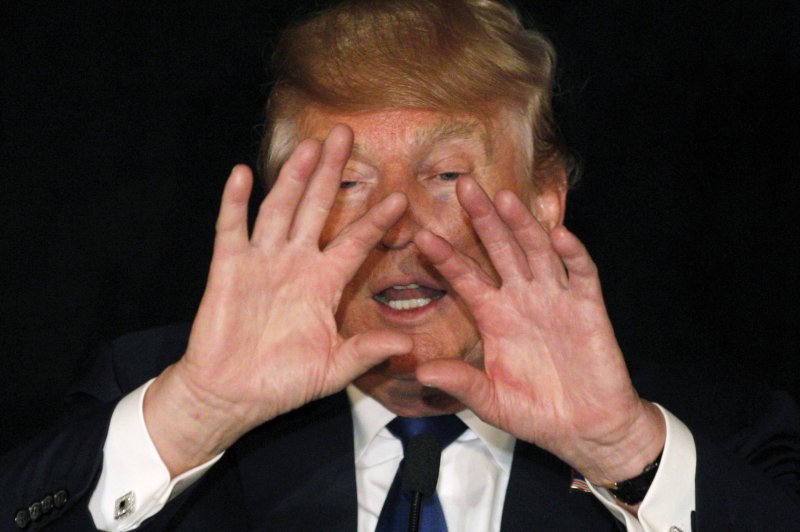Republican presidential candidate Donald Trump has split public opinion at the international, national and Republican party levels with his comments on Muslims. Pictured, Trump speaks to the crowd at the Executive Meeting of the New England Police Benevolent Association in the Sheraton Portsmouth Harborside Hotel in Portsmouth, New Hampshire on December 10, 2015. The group endorsed Mr. Trump for President. Photo by Matthew Healey/UPI |
License Photo
Donald Trump is rapidly becoming the Republican Party's equivalent of Britain's Labor Party leader Jeremy Corbyn. The question is whether Trump's destructive personality and rhetoric will do to the GOP what Corbyn has done to disintegrate Labor, in essence making Great Britain a one party system dominated by the Conservative Party. Of course profound differences exist. The Republicans control one end of Pennsylvania Avenue, at least until January 2017.
David Cameron's surprising electoral victory earlier this year gave his party a majority in the House of Commons (330 seats) routing both Labor (232 seats) and the Liberal Democrats (8 seats) while the Scottish National Party (54 seats) advanced. But what hurt Corbyn more and split Labor was last week's vote authorizing Britain to mount strikes against Syria following the Paris attacks. Corbyn voted no. Shadow Foreign Minister Hilary Benn gave a bravura speech arguing for approval, convincing 66 Labor MP's to join Cameron's majority. A similar resolution had been voted down in 2013.
Mr. Trump's incendiary remarks to deny Muslims access to the United States produced a Tsunami of angry protests inside and out of the Republican Party. When Dick Cheney criticized the ban, it was clear Trump went too far. Trump, as is his modus operandi, doubled down and then offered caveats as to what he originally meant, specifically that his ban applied until the government established new entry rules and that American Muslims, foreign Muslim leaders, and others were exempt. He cited U.S. actions during two world wars rounding up Germans, Italians and, infamously, Japanese Americans after Pearl Harbor, using the policy of internment camps as the rationale for denying Muslims entry.
Comparisons with Mussolini, Hitler and fascism sprung up like weeds. But a better political comparison for the GOP may be Jeremy Corbyn and what he has done to Labor. It is quite possible that Trump could have the same effect on his party.
The GOP is caught on the horns of an exquisite dilemma. No rational or sensible Republican would support or even tolerate Trump's extremism. It is clearly unconstitutional, undemocratic and, as the White House argued, disqualifying for any presidential candidate. However, a substantial slice of Americans instinctively agree with Trump as fear of future Islamic State or al-Qaida terror attacks at home takes hold.
That fear is irrational and ungrounded in reality. Yet, despite the facts, it persists. Since September 11th, radical Islamists have killed less than 50 Americans at home.
In 2015, American police have shot nearly 1000 suspects. Over the past fourteen years, that figure is obviously many times larger. But, using this year alone, the chances of being killed by a police officer are twenty times greater than being murdered by a radical terrorist.
Still people are fearful. Fear is a powerful weapon and motivation. And Trump knows how to manipulate that fear.
The other side of the dilemma is that if Republicans go too far in censoring Trump, will he bolt from the party and run as an independent? And would the party be better off for the long term if he left, realizing that such a defection would almost guarantee a Democrat in the White House and possibly future control of at least the Senate?
To the degree the past is prologue, Trump may escape the deserved wrath his comments justified. He seems to be made of Teflon. However, that elusive quality threatens the future of the GOP in 2016. And who knows if this firestorm will have even longer lasting impact.
Democrats are certainly relishing the moment. But that moment may be fleeting. President Barack Obama and his plan for destroying the Islamic State are still under attack for failing to achieve that objective. While Trump's outrage severely damages the GOP, clearly Republicans will try to change the debate. And that will lead to greater criticism of the president and by extension his former Secretary of State and presidential candidate Hillary Clinton.
The damage is not limited to these shores. Friends and enemies alike have and will overreact to Trump. America's image will be further tarnished. IS will make great propaganda value of the call for preventing Muslims from entering America.
The storm will pass. But great damage has been done. As the nation and Republicans dig out from the detritus left by Trump, a looming question remains. Will Trump do to the party what Corbyn has done to Labor? Stay tuned.
_______________________________________________________________________
Harlan Ullman is UPI's Arnaud de Borchgrave Distinguished Columnist; Chairman of the Killowen Group that advises leaders of government and business and Senior Advisor at Washington DC's Atlantic Council and Business Executives for National Security (BENS). His latest book is A Handful of Bullets: How the Murder of Archduke Franz Ferdinand Still Menaces the Peace.















